Environmental Stewardship
It’s been a good week for getting real. After Tuesday’s revelation that the majority of Americans link increased natural disasters with climate change, a new report yesterday indicates that they may be right.
In their newly-published report, reinsurance company Munich Re claimed that global climate change has been driving natural disasters and extreme weather events, and that this trend will increase as the climate continues to change.

In my last column, "Three Numbers that Predict the Future of the Planet", I wrote about the state of the climate crisis and focused on three key data points that reveal a bleak, though not altogether hopeless, reality for us and for the rest of the planet.
As promised, this column is forward-looking and moves from describing the problem to prescribing the solution. To this end, I continue to draw heavily from the wisdom of Bill McKibben, Jim Ball, and other climate prophets who understand the times and are faithfully fighting to get us on the right track.
The way forward is not easy, but it will be good in the long run. Essentially, we need to set and enforce a limit on all remaining global warming pollution on the national and international scale, which will, we hope, keep warming to within 2oC. This will include some sort of pricing mechanism so that polluters have to take responsibility for paying for the costs of their own pollution. The problem is that we have not yet been able to muster the socio-political momentum necessary to reach these binding agreements. Turns out the polluters (largely the fossil fuel industry) don’t want to have to clean up after themselves. They’re also willing to fight with billions of dollars in campaign contributions and lobbying money to keep the status quo.
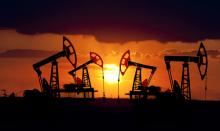
“LOTS OF COMPANIES do rotten things in the course of their business—pay terrible wages, make people work in sweatshops—and we pressure them to change those practices,” says veteran anti-corporate-abuse leader Naomi Klein. “But these numbers make clear that with the fossil-fuel industry, wrecking the planet is their business model. It’s what they do.”
The numbers she’s referring to are straightforward—they were first put forth in a report by a group of U.K. financial analysts a year ago, and they’ve now begun to seep into the debate about climate change. They show that if we have any hope of keeping the increase in global temperature below the 2 degree Celsius line (a goal so conservative that even the U.S. and Chinese governments have embraced it as their target), we can only emit 565 more gigatons of carbon dioxide. But the fossil-fuel industry, it turns out, has 2,795 gigatons worth of carbon in its inventory—that is, five times what it would take to run the Genesis creation story backwards.
In other words, this is not a case of “bad business practices.” It’s not like Apple paying bad wages or making workers use dangerous chemicals. Those are deplorable, and correctable—they’re what the boycott or the shareholder resolution was invented for. That’s how we’ve fought everything from grape growers to sweatshops.

EVEN AS ELECTION-YEAR news cycles move on, the nation faces the aftermath of a prolonged and dramatic heat wave. July 2012 broke two records: It was the both the warmest July ever recorded and the warmest month—period—ever recorded in the lower 48 states. In our home of Chicago, temperatures crept past 100 five times. Moreover, the extreme drought of 2012 is not a random event, but part of a worrisome trend.
Global climate change has come to the heartland. Unless we take collective and decisive action, 102 could become the new 93. And it’s not just armpits and foreheads that will sweat. We have already glimpsed the future, and it is not pretty: massive forests burned in Colorado; major power outages; thousands of acres of crops lost to drought in Illinois, Indiana, Kansas, Missouri, Oklahoma, and elsewhere. These ominous events are indications of the “new normal” unless we make widespread changes in fossil-fuel consumption.
The farming crisis has been acutely severe—and it is directly related to climate change. This summer, the U.S. Department of Agriculture designated more than half of all U.S. counties as disaster areas (1,584 in 32 states). Fred Below, a crop biologist at the University of Illinois at Urbana-Champaign, bluntly summed up the reality: “It’s like farming in hell.”
Ironically, agriculture is the human activity that emits more greenhouse gases into the atmosphere than any other source, including transportation and industry. A key reason: Today’s agriculture intensively depends on burning fossil carbons. (Methane emission from cows and rice fields, and deforestation to clear farmland in the global South, are also contributors.) Being so dependent on fossil fuels means that the food sector is the greatest contributor to global climate change—and that rising oil costs increase food costs, squeezing the poor and marginalized.

The climate crisis is getting bad and we may be finally starting to notice. With increasingly crazy weather across America—scorching heat waves, massive fires, destructive derechos, devastating droughts—polls are starting to show a growing awareness of and concern for how our massive amounts of pollution are changing the weather and therefore changing our lives (mostly for the worse).
I know this is starting to sound alarmist and extreme. It should. Because reality is starting to get pretty desperate for those whose lives and livelihoods depend on a relatively stable and predictable climate. At the end of the day, that’s all of us. The first to get hit, however—and they are currently getting hit hard—are those who grow and raise our food (farmers, ranchers, fishermen, etc.), those who are economically and physically vulnerable (the elderly, sickly, homeless, etc.), and those who just happen to be in the wrong place at the wrong time (the victims of these storms and fires). And while we’re starting to feel the impact of climate change in the United States, our global neighbors in regions such as Africa have been the ones bearing the brunt of the suffering.
After decades of scientific studies and expert warnings, climate change is no longer something being debated; it is something being experienced. Let’s just hope we do what’s right to overcome this crisis before it is too late. Because “too late” may be coming a lot sooner than we realize, and “what’s right” may be a lot harder than we want to accept.
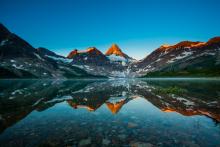
For most of my life, I have been a “Christian with conjunctions.”
So I’m a Christian BUT… I’m not like that street preacher who yells about hell and damnation on the downtown corner.
I’m a Christian BUT I’m different from the televangelist who raises his fist in the air and screams about salvation.
My own priest, the Rev. Thomas Murphy, first described himself as a Christian with conjunctions in a sermon the morning before our Episcopal congregation took to the streets during a festival in downtown Asheville, N.C. Across the street from a karaoke booth, we handed out cold water to festivalgoers and offered a simple ministry with no judgment or obligation.
For most of us, it was the first time we had prayed the Eucharist in public, with our colleagues, students, and neighbors walking past. The white banner above us proclaimed: “God loves you. No exceptions.”
I have realized that the ubiquitous street preacher has something to teach me: there is virtue in being bold about my faith. Through my research on congregations and climate change, this public witness to God’s love has become easier for me as my church life now reflects my deep value of God’s good earth.
The stakes of silence are high. If we don’t speak out and act on our moral mandate to reconcile with creation, we risk destroying God’s very creation.
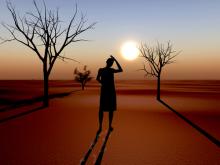
Because the scientific evidence surrounding climate change is clear, and the implications for humankind are many, the response to these global challenges needs to be persistent, organized, and significant. As Jesus calls upon humankind to “love thy neighbor," and as the Old Testament prophets remind us to strive for justice, we recognize that within a deeply connected world “neighbor” implies all that God has created, and injustice anywhere is injustice everywhere.
So an implication of Jesus’ words and actions is to share and receive the Good News not only on Sunday mornings, but through daily acts of long-term advocacy that promotes sustainable livelihoods. With COP18 in Qatar on the horizon, the time has come when humanity can no longer afford to fight over our resources, and the moment is upon us to prod our elected officials toward legally binding legislation that values the gifts of creation that God has entrusted us to manage.
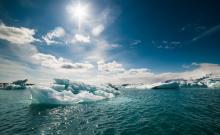
The melting of sea ice during summer in the Arctic is part a natural cycle, but the rate at which the sea ice is currently melting is unprecedented, as illustrated in today’s BBC News.
"Norwegian researchers report that the sea ice is becoming significantly thinner and more vulnerable.
Last month, the annual thaw of the region's floating ice reached the lowest level since satellite monitoring began, more than 30 years ago.
It is thought the scale of the decline may even affect Europe's weather."

Hey, is this good news, or what?
Give up organic heirloom tomatoes at $4.99/pound!
Stop paying $5.99 up for a gallon of organic milk!
Buy cheaper ground beef than the organic grass-fed stuff at $7.99+/pound!
Slow down, folks. Read the articles, not just the attention-grabbing headlines. What the scientists discovered was basically this: Take two identical, ripe, juicy, fresh peaches, one of which was grown organically and one of which was not. Analyze the nutritional profile of each. You will find that one peach has just about the same vitamins as the other.
OK, and I'll bet they're pretty much the same color, too. And they probably weigh the same. And if dropped from a tall building, they most likely will go splat at about the same time.

COAL, NATURAL gas, petroleum. Thoughtlessly we call these substances “fuels”—fuels to burn for creating pleasant climates inside homes and offices; fuels to power appliances and engines. For years, like nearly everyone, I never thought beyond our mere use of these things. I neglected to consider their role in the Earth’s wider economy.
This all changed when my family moved to a Wisconsin peatland in 1972. Since then, conducting research there with my graduate students has produced four decades of discovery.
For thousands of years, wetland plants and algae in a bay of glacial Lake Waubesa took carbon dioxide from the atmosphere. They transformed it by photosynthesis into the carbon structure of life, eventually adding their remains, page upon page, to the accumulating peat. Eventually, this peat filled the bay for an area more than a mile long, reaching a depth of 95 feet at the present lake edge. When first I walked here, I saw the vibrant surface of plants and wetland creatures; now, in my mind’s eye, I also see the deep-layered remains of creatures below.
Also standing and walking here (much more gracefully than I) are sandhill cranes. These stately creatures, as conservationist Aldo Leopold observed, “stand, as it were, upon the sodden pages of their own history.” Elsewhere, the sodden pages of peat deposits have been cut over the ages to be dried for fuel. The early Romans saw this practiced by conquered peoples of northern and western Europe. Peat was also used as fuel in Ireland, Scotland, and northern Europe after forests were cleared for agriculture. And peat is the precursor of coal, transforming under geologic pressure into brown coal, bitumen, bituminous coal, and anthracite.
According to Reuters (via Chicago Tribune):
An earthquake of 7.9 magnitude struck off the Philippines on Friday and a tsunami warning has been issued for the region, the U.S. Geological Survey and the Pacific Tsunami Warning Center said.
The quake was centered off the east coast, 91 miles off the town of Guiuan in Samar province at a depth of about 20 miles, USGS said.
The tsunami warning was issued for the Philippines, Japan, Indonesia, Taiwan, Papua New Guinea and other islands in the Pacific including the U.S. state of Hawaii.
"An earthquake of this size has the potential to generate a destructive tsunami that can strike coastlines near the epicenter within minutes and more distant coastlines within hours," the Pacific Tsunami Warning Center said.
The quake struck just before 8:50 p.m. local time, the agency said.
There were no immediate reports of damage or injuries.
“Peace for humanity is not only the absence of war, or the end of violence ... For us Christians, peace is based on a fundamental new relationship between mankind and God. That is why Christ said he brought peace, ‘not as the world gives.’ He brought a different peace.” – Bishop Samuel Ruiz García, known as Don Samuel, a champion of the poor and of the indigenous people in southern Mexico
Eastern Congo is home to some of the world’s most stunning scenery—and some of its most brutal and unimaginable violence. The relationship between these two symbols of the region is a close one.
Part of the call of Christian peacemakers is not only to make peace between people a reality, but also to bring peace between people and the planet. In his work, conservationist Dominique Bikaba recognizes that peace between people and peace with our environment are closely intertwined, and he is seeking to bring about both.
Armed groups are waging war in eastern Congo, taking no heed of the grave impact that the conflict is having on the environment around them. The resources of the region are being exploited, to the detriment of future generations. This disregard for the communities of the region is a modern-day salting of the land. It’s a practice well known to the people of Israel in the Old Testament, in which armies would spread salt on the land of their adversaries so that nothing would grow there (see Judges 9:45).
The conflict in Congo is being waged on local communities—but Dominique is a problem-solver. He is seeking creative ways to conserve these communities while conserving the environment they inhabit, fostering the inherent relationship between the two. He is “bringing the forest to the community.”
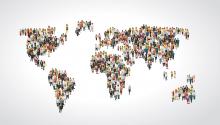
An examination of current public debate reveals a divide between the “brown agenda” of economic opportunity and the “green agenda” of environmental sustainability.
On the one hand, a “brown agenda” concerns economic opportunity, or in other words, the alleviation of poverty. In light of ongoing distress surrounding malnutrition, infant mortality, and unemployment, the brown agenda is important, urgent, and worthy of support. On the other hand, a “green agenda” relates to environmental sustainability and care for the Earth. As scientific reports affirm the reality of climate change, and in recognition of decreased access to clean water and biodiversity around the world, the green agenda is also deeply important, urgent, and worthy of support.
With the above thoughts in mind, one recognizes that both brown and green agendas are essential for the promotion of life. However, the proponents of each agenda seem to be at odds with the adherents of the other. For example, far too many with a “brown agenda” believe that the best way to reduce poverty is to reduce environmental controls, and to the contrary, those engaged with the “green agenda” too often place the needs of the Earth before the livelihoods of the poor and marginalized. As a result of this persistent struggle between “brown” and “green," progress on both agendas is limited, and our path toward economic opportunity and environmental sustainability is severely off course.
New results from the National Oceanic Atmosphere Administration show that July 2012 was the hottest summer on record for the United States, since accurate record keeping began in 1895. With an average temperature of 77.6 degrees Fahrenheit, last month's heat wave surpassed July 1936 (which recorded an average of 77.4) to become the steamiest summer around.
In a report on NBC, NOAA climate scientist Jake Crouch explains:
"These events are kind of what we'd expect with climate change, we'd expect expanding drought, we'd expect warm, record breaking temperatures… But it's kind of hard to pinpoint this month or past several months as a telltale sign that climate change is happening. The drought is more of a local factor and isn't necessarily driven by large scale climate change, but is impacting local temperatures. But we've also seen an increase in U.S. temperatures overall."
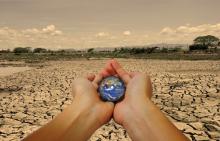
Last month, Rolling Stone magazine featured Bill McKibben's latest plea for climate sanity on its cover. And despite every pundit's whining proclamation that climate change is such a buzz-kill, Bill's article got forwarded, commented, tweeted, and otherwise pushed around the Internet more than anything else RS has put out lately.
So somebody out there is paying attention to climate change — even if the elites can't seem to grow a spine about it.
What I liked about Bill's article was that he lays out a clear, 3-pronged strategy for really doing something about climate change while there's still time.
If we do these three things, there's a possibility that we can reverse climate change, restore health to our skies, earth, and oceans, and move forward into a future where our grandkids can not just survive, but thrive.
Here's the plan.
Fred Krupp writes in The Wall Street Journal:
One scorching summer doesn't confirm that climate change is real any more than a white Christmas proves it's a hoax. What matters is the trend—a decades-long march toward hotter and wilder weather. But with more than 26,000 heat records broken in the last 12 months and pervasive drought turning nearly half of all U.S. counties into federal disaster areas, many data-driven climate skeptics are reassessing the issue.
Respected Republican leaders like Govs. John Kasich of Ohio and Chris Christie of New Jersey have spoken out about the reality of climate change. Rupert Murdoch's recent tweet—"Climate change very slow but real. So far all cures worse than disease."—may reflect an emerging conservative view. Even Exxon Mobil CEO Rex Tillerson, during public comments in June, conceded the reality of climate change while offering assurances that "there will be an engineering solution" and "we'll adapt."
Learn more here
Last weekend the New York Times published an op-ed by University of California-Berkeley physics professor, Richard Muller, who said he has changed his professional opinion on the cause of global warming:
“Call me a converted skeptic. Three years ago I identified problems in previous climate studies that, in my mind, threw doubt on the very existence of global warming. Last year, following an intensive research effort involving a dozen scientists, I concluded that global warming was real and that the prior estimates of the rate of warming were correct. I’m now going a step further: Humans are almost entirely the cause.”
Muller’s announcement sparked a media flurry throughout the week, and NPR’s Science Friday host, Ira Flatow, interviewed him today. You can listen to the audio recording HERE.
WHEN I READ about the dire impacts of global warming, I think about Howard Thurman. This might be perplexing to those more familiar with Thurman as the author of Jesus and the Disinherited, a book Martin Luther King Jr. was said to carry with him wherever he went.
While Thurman is well-known as a theologian, prolific writer, mystic, seminary professor, and religious leader, few realize that—well before environmentalism became mainstream—Thurman articulated a complex theology of the “original harmony of creation,” a harmony that human action had significantly disturbed. As he lamented in 1971, “Our atmosphere is polluted, our streams are poisoned, our hills are denuded, wildlife is increasingly exterminated, while more and more [humanity] becomes an alien on the earth and a fouler of [our] own nest.”
From the early years of his life at the start of the 20th century, Thurman’s faith was formed in intimate connection with the natural world—specifically, the Halifax River and northeast Florida woods and coastline, where he wandered and played as a boy. Thurman’s relationship with nature deepened when a heartbreaking event estranged him from organized religion. When he was 7, his beloved father died quite suddenly. The family pastor refused to conduct a funeral because his father was not a regular churchgoer, and a traveling minister who officiated at the service took the opportunity to expound on the dangers of dying “out of Christ”—to the small boy’s wonderment and rage, “preach[ing] my father into hell,” as he later recalled.
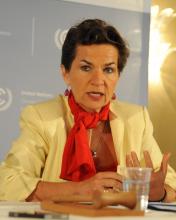
Bio: Executive Secretary of the U.N. Framework Convention on Climate Change, figueresonline.com
1. How much did religious leaders advocate against global warming at the United Nations climate talks this past winter in Durban, South Africa?
I have been very impressed over the past few years at how the faith community is getting more and more involved in climate issues; they are concerned about what humanity is doing to creation. In Durban we had, of course, Archbishop Tutu, who was there as the local leader of the faith community, but we also had probably the largest participation of the faith community we’ve ever had, from religions from around the world, trying to support the process.
2. So the U.S. is unusual in that the reality of climate change is sometimes contested on religious grounds here?
Yes, that is a unique situation.
3. How are military entities engaging with climate change?
It’s very interesting how the military has become acutely aware of the fact that climate represents, probably, the most difficult security issue that they are going to face over the next 20 years, just because of migration. We see areas that are going to be underwater, that are going to be in drought—there is going to be a massive migration such as we have never seen, which represents a severe security problem for what are currently stable states.
The U.S. military has already done quite a few studies about the implications of climate change on the security and the borders of the United States. And they, I think, are taking on much more of a progressive role; they’re wanting to contribute to addressing climate change. They are already looking at investing in new technologies that are much more efficient in the use of energy. They’re actually taking good leadership.